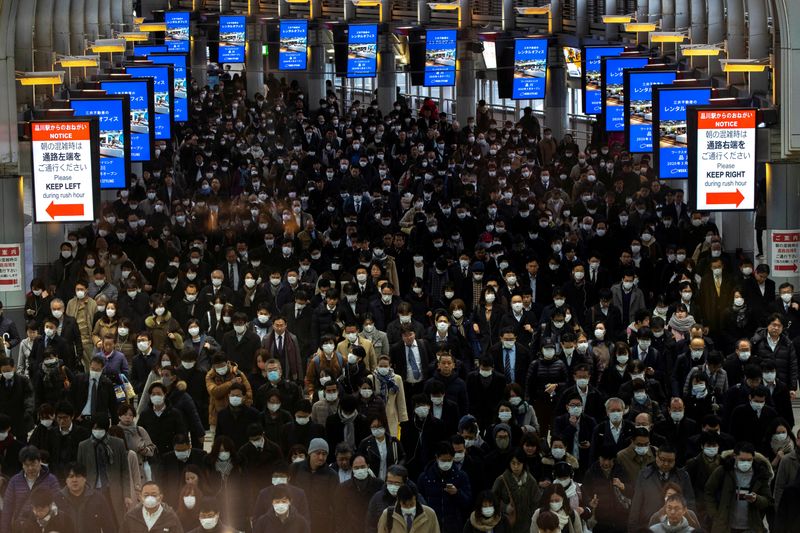By Kiyoshi Takenaka and Linda Sieg
TOKYO (Reuters) - Japan warned on Thursday of a high risk the coronavirus would spread widely and set up new a task force to fight it after the capital saw a big jump in cases, although the economy minister said a state of emergency would not be declared for now.
The new task force is a necessary step towards declaring an emergency. The announcement comes amid worries of spread in the community after the surge in Tokyo, where broadcaster NHK said more than 45 new cases were reported overnight.
Despite being an early focus of the disease which hit a cruise ship docked near Tokyo last month, Japan has so far avoided the widespread explosion in cases that has hit Europe and North America, where numbers are rising by thousands a day.
Before the latest surge in Tokyo, Japan had 1,314 domestic cases of coronavirus, as well as 712 from the cruise ship. There have been 46 domestic deaths and 10 from the cruise ship, according to Kyodo news agency.
"I told Prime Minister (Shinzo) Abe there is a high risk of coronavirus spreading widely," Health Minister Katsunobu Kato told reporters after meeting Abe and Economy Minister Yasutoshi Nishimura. Nishimura said Abe told him to "proceed swiftly with setting up the government taskforce" based on Kato's report.
But the government was not considering declaring a state of emergency at the moment, Nishimura said.
Under a law revised this month to cover the coronavirus, the prime minister can declare a state of emergency if the disease poses a "grave danger" to lives and if its rapid spread threatens serious economic damage.
Japan was already teetering on the brink of recession before the virus struck.
A state of emergency would allow governors in hard-hit regions to take steps that have been taken in Europe and U.S. states, such as asking people to stay home, closing schools and other public facilities and cancelling large events.
Japanese shares tumbled on Thursday following three days of big gains after the rise in domestic coronavirus cases stoked worries of tougher restrictions for social distancing.
Hitachi Ltd instructed 50,000 employees at its group companies in Tokyo to work from home and avoid unnecessary outings.
A landmark department store in Tokyo's Shibuya district - popular with young people, many of whom have continued to go out to play and shop - said it would close on the weekend. Toho Cinemas also said it would close its movie theatres in Tokyo and nearby Kanagawa prefecture on Saturday and Sunday.
Tadashi Matsukawa, Tokyo head of fixed income investment at PineBridge Investments, said while people were panic buying in fear of a lockdown, they were unlikely to buy big-ticket items and some products might not be available anyway.
"On the whole, I suspect there will be considerable damage to the economy,” Matsukawa said.
'CRITICAL TIME'
An increasing number of cases the origin of which cannot be traced has experts worried about a surge in the community along with more infections from people returning from abroad.
On Wednesday, Tokyo Governor Yuriko Koike warned of the risk of an explosive rise in infections in the capital and asked residents to avoid non-essential outings through April 12, especially over the weekend. She repeated her call on Thursday.
Koike was to meet Abe later on Thursday, private broadcaster TBS reported.
"The government and local authorities will cooperate based on the awareness that this is a very critical time to prevent the spread of the virus," Chief Cabinet Secretary Yosihide Suga told a news conference.
Suga later said the risk of the spread of infection was high, but there was no need to change the government's plan to have schools - many of which closed earlier this month at Abe's request - reopen in early April.
The International Olympic Committee and the government on Tuesday agreed to put back the Tokyo 2020 Olympics to 2021 over the outbreak.
Tokyo Governor Yuriko Koike has asked the neighbouring prefectures of Saitama, Chiba and Kanagawa to ask their residents to refrain from non-urgent, non-essential travel to Tokyo, the Nikkei business daily reported.
The governor of Kanagawa, near Tokyo, later asked residents to stay at home this weekend.
Abe has already told schools to close - though many are preparing to reopen - and organisers to refrain from large-scale events, but his instructions had no formal legal basis.
Even if a state of emergency is eventually declared, experts noted there are no penalties for ignoring most of the local authorities' instructions.
"The government of Japan is getting close to declaring a 'state of emergency' but even if so, no penalty for defying requests to stay home," said Kenji Shibuya, director of the Institute for Population Health at King's College, London.
A declaration would, however, put more pressure on people and businesses to obey.
On a sunny three-day break last weekend, crowds of people were out in Tokyo despite bans in some areas on picnics for the traditional spring "hanami" cherry-blossom viewing.
On Thursday, tabloids blared “Tokyo Lockdown Panic” and “Tokyo Destruction".
But a long line of people waited at a chocolate croissant cafe in Tokyo for lunch, while subways were packed and people lined up before drug stores opened to buy masks and sanitary products that are in short supply.
